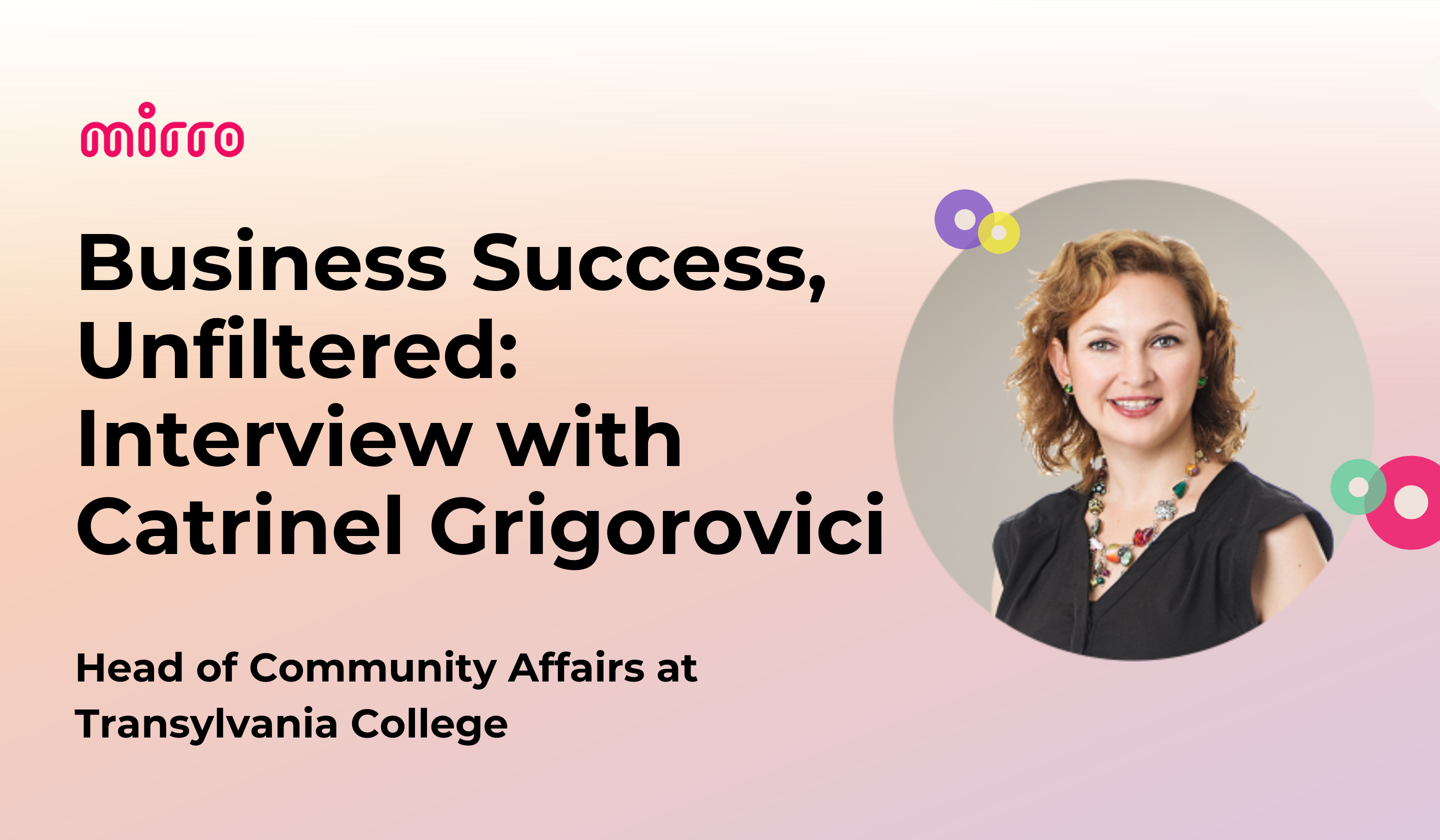SECTION
Business Success, Unfiltered: Interview with Catrinel Grigorovici, Head of HR at Transylvania College

Listen to this article:
Welcome to the first interview of “Business Success, Unfiltered: Behind the Scenes with People-First Leaders,” a series dedicated to candid conversations with HR and business leaders who are reshaping workplace culture by putting people first.
According to Gallup research, only 25% of teachers strongly agree that they’ve received recognition for their good work in the past week. The low statistics reveal a harsh truth: the education system often overlooks the individuals who shape the future: our teachers. When recognition is missing, productivity and engagement decrease significantly.
To shed more light on this topic, we sat down with Catrinel Grigorovici, Head of Human Resources at Transylvania College. Her work in modernizing performance management and recognition practices has not only enhanced teacher engagement but also helped the school confirm its prestigious British School Overseas (BSO) accreditation.
Q: Thank you so much for joining us, Catrinel! You’re the Head of Human Resources at Transylvania College, a role that blends both leadership and community-building. What inspired you to take on this role, and why does recognition matter so much in your school?
Catrinel: Thanks for having me! The role felt like a perfect blend of strategy and relationships. Transylvania College is a vibrant, caring community that guides children from nursery through high school. We have around 700 students and nearly 170 staff members representing 35 nationalities—truly a multicultural and purpose-driven community. That sense of unity really drew me in.
Q: Gallup's research shows that only 25% of teachers feel they receive recognition for doing good work. Does that ring true in schools you’ve worked in?
Catrinel: Absolutely. In my experience, many teachers go above and beyond, yet these efforts frequently go unacknowledged formally or consistently. This lack of recognition can lead to disengagement, burnout, and even attrition, particularly in high-stress environments. I've noticed that when recognition does happen, it has a noticeable impact on morale. Teachers feel valued, more connected to the school community, and motivated to continue their efforts.
Q: That’s right, recognition has a direct influence on teachers’ performance. Gallup reports that teachers who receive regular recognition are more productive and engaged and more likely to stay with their school. And here at Transylvania College, how has recognition shifted the game?
Catrinel: As school HR, we play a crucial role in developing systems and tools that promote consistent, meaningful recognition, which in turn supports retention, job satisfaction, and a positive culture. Since we implemented Mirro four years ago, I have witnessed a noticeable increase in staff engagement, particularly in terms of recognition and feedback.
For example, in the first two years, the number of lesson observations registered in Mirro increased from 138 to 422. We got to 100% platform usage within the first month. The Endorsement Cloud shows our big commitment to staff well-being.
The platform has provided a structured and accessible way for teachers and staff to acknowledge one another's contributions in real time. This has helped create a more positive and supportive school culture.
Q: That’s incredible! This frequent recognition places your school above the market average, where less than 35% of employees receive praise at least once per quarter. You mentioned the importance of a positive and supportive culture. What impact are you seeing?
Catrinel: It's about visibility. Everyone—from admin teams to teachers—is receiving regular recognition. We’ve seen 26% of our staff become “Kudos champions.” That culture of appreciation builds trust and ties across departments. People collaborate more and genuinely appreciate each other’s talents. Mirro has helped us bridge the gap identified by Gallup, turning recognition from an occasional gesture into an ongoing part of our school culture.
Q: In your experience, how do HR tools and systems that facilitate collaboration and feedback contribute to strengthening the sense of belonging among staff?
Catrinel: A key aspect is the visibility and creativity of HR tools similar to those found on social media channels. When appreciation and constructive feedback are part of everyday interactions, rather than just annual reviews, it fosters a culture of connection. Over time, this consistent engagement contributes to a stronger, more cohesive community where people feel seen, heard, and supported. In Transylvania College's case, Mirro didn't just improve processes but helped humanize them, making collaboration and appreciation an everyday part of school life.
Q: Let’s talk about the BSO accreditation, earned again in November 2024 through a four-day review by Penta International. How did your HR practices play into that?
Catrinel: Mirro was mentioned in the BSO report for good reason. It “ built a strong professional performance management and workplace culture with the support of a tool called Mirro. All members of staff can share best practices and connect with colleagues from various departments and give and receive ‘Kudos’. The tool is designed to enhance teacher performance and to gather all lesson feedback in one place, with positive and also constructive feedback, enabling teachers to refine their teaching strategies. It helps the school foster a culture of continuous improvement, ultimately benefiting both teachers and students.
A BSO inspection (British Schools Overseas inspection) is an official evaluation process carried out by UK government-approved inspectorates to assess the quality and standards of British international schools operating outside the United Kingdom. It lasted four days and was conducted by a team of three trained inspectors. It focuses on key areas such as teaching and learning, student welfare, safeguarding, leadership, and overall school management. Successful schools receive accredited status and offer reassurance to parents, enhancing staff recruitment, and demonstrating the school’s commitment to delivering a high-quality British-style education internationally.”
Q: If you could wave a magic wand and change one thing about how the HR processes are handled in schools, what would it be and why?
Catrinel: If I could, I would fully integrate all HR functions into a single, intuitive digital platform: from onboarding to performance management and, most importantly, staff well-being. No scattered docs, no manual workflows. Currently, many schools rely on fragmented systems or manual processes. This kind of integrated approach would provide school leaders with real-time insights into every teacher's journey, enabling them to act quickly, support teachers more effectively, and enhance their well-being.
Q: Finally, if there’s one piece of advice you could offer other school leaders looking to improve recognition and performance management to create a more engaged and motivated staff, what would it be?
Catrinel: Cultivate a culture where recognition, feedback, and well-being are not occasional efforts but everyday practices. At Transylvania College, tools like Mirro and Spark Generation have helped us do just that.
Mirro has transformed the way we approach recognition, making it easy for staff to acknowledge each other's efforts in real-time, fostering a positive, collaborative atmosphere across departments. Recognition is no longer reserved for formal settings; it happens continuously, reinforcing a sense of value and belonging.
At the same time, Spark Generation has allowed us to place a stronger focus on teacher well-being. The platform is designed to reduce staff and student stress, as well as teacher burnout, and create a thriving school community through well-being assessments, personalized courses, dashboards, and online coaching sessions. That's the foundation of a thriving educational community.
TL;DR: Why this conversation matters
Catrinel's work at Transylvania College demonstrates that investing in human connection, feedback, and well-being is not only beneficial for morale and productivity but also a necessary step forward.
As we continue this series, we'll explore more stories from HR and business leaders who are committed to putting people at the heart of business success. Keep an eye on us to be the first to read their experiences!






